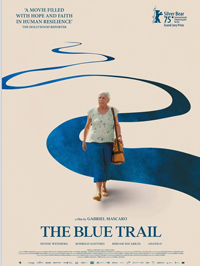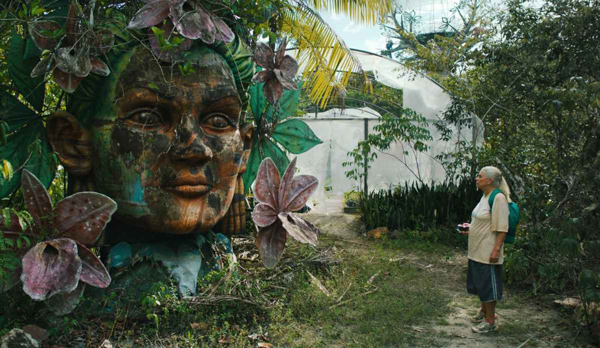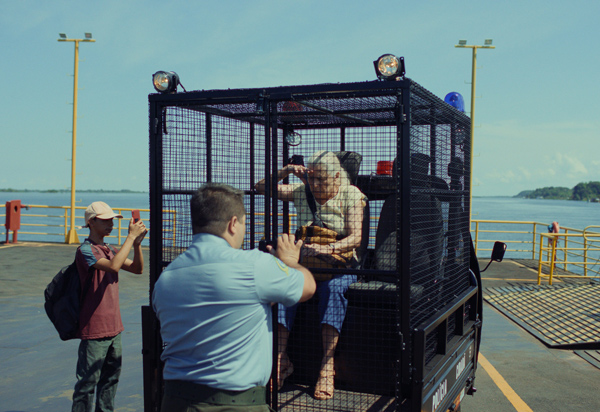Crimes of the Future: Mascaro Envisions Trouble Ahead
 “Getting old ain’t no place for sissies,” a quote often attributed to Bette Davis (or similar variations of the sentiment) easily applies to The Blue Trail, Brazilian director Gabriel Mascaro’s fourth feature which depicts a near-future world where the elderly are conscripted against their will to an isolated concentration camp so the country’s youth can more easily focus on working. While darkly comedic in tone, it’s also a life changing odyssey for its central protagonist, a spry seventy-seven-year-old woman who is unwilling to obey these newly imposed orders. Pleasurably mordant in its critique of governmental propaganda disguising violence and inhumanity, Mascaro showcases lead Daniela Weinberg (of Armando Praça’s Greta, 2017) as a witty, resourceful woman who is far from ready to walk gentle into that good night.
“Getting old ain’t no place for sissies,” a quote often attributed to Bette Davis (or similar variations of the sentiment) easily applies to The Blue Trail, Brazilian director Gabriel Mascaro’s fourth feature which depicts a near-future world where the elderly are conscripted against their will to an isolated concentration camp so the country’s youth can more easily focus on working. While darkly comedic in tone, it’s also a life changing odyssey for its central protagonist, a spry seventy-seven-year-old woman who is unwilling to obey these newly imposed orders. Pleasurably mordant in its critique of governmental propaganda disguising violence and inhumanity, Mascaro showcases lead Daniela Weinberg (of Armando Praça’s Greta, 2017) as a witty, resourceful woman who is far from ready to walk gentle into that good night.
Weinberg bears a striking resemblance to Ruth Gordon as the wily Tereza, whose daughter has already become a complicit conspirator in her mother’s fate. Upon learning the age of admittance to the senior ‘colony’ has been reduced to the age of seventy-five, she quickly tries to experience one final pursuit, to experience flying. Although she has one week to accomplish this, it appears the door has already been closed on this dream, as she’s already been designated as a ward of her daughter, who denies permission for her mother. Thus begins a tricky odyssey for Tereza, who encounters Cadu (Rodrigo Santoro), a lonely riverboat captain involved in shady dealings who agrees to take her to a nearby town where she can experience an illegal flight. On their journey, they encounter a mysterious snail exuding a ‘blue drool’ which upon dripping into one’s eyes can unveil one’s future destiny.

When Tereza’s flight plans are ultimately foiled, she resigns herself to returning home where she’s immediately placed in what the locals refer to as the ‘wrinkle wagon,’ an iron cage used by the police to nab elders who have violated their reporting orders. Making a last ditch attempt at freedom, Tereza has the good luck of running into Roberta (Miriam Socarras, Los Frikas, 2024), a mischievious woman who poses as a nun working on a large pontoon selling expensive digital bibles. Roberta has purchased her own freedom, but must exist on the boat, constantly departing. A fast paced friendship ensues, and Tereza is invited to stay with Roberta. When they come upon another blue snail, both women decide to experience a vision of their future, leading Tereza towards a mighty gamble.

Prescribed death for population control isn’t necessarily a nightmare never explored before, with films like Caitlin Cronenberg’s Humane (2024) heralding potential government programs designed to save dwindling resources in an overpopulated world. But Mascaro’s latest feature bears a strong resemblance to the 1958 Japanese masterpiece The Ballad of Narayama (remade by Shohei Imamura in 1983) where members of a poor village are directed to climb a mountain once reaching the age of seventy to die.
Mascaro’s growing filmography has thus far depicted characters who are either fixated on their future, such as his exquisite 2015 title Neon Bull (read review), or are struggling to reconcile a paradoxical nightmare such as 2019’s Divine Love (read review), where fundamentalist Christianity and hedonist orgy cults fixated on procreation become strange bedfellows. While The Blue Trail is more contained than either of those films, it bears a similar electric undercurrent mixing lush, rural landscapes interrupted by neon-lit demimondes. Memo Guerra’s score collides with DP Guillermo Garza’s sumptuous visuals, especially in a climactic duel between a red and white betta fish, the outcome of which will be the actual determination of Tereza’s ‘future.’
While The Blue Trail ends on a tenuous note, it envisions a troubling, slippery slope of a future which doesn’t seem inherently unimaginable. Planes flying overhead in the sky spew out daily messages to the inhabitants below, asserting ‘the future is for everyone.’ But sadly, this has never been the case.
Reviewed on February 16th at the 2025 Berlin International Film Festival (75th edition) – Main Competition. 86 mins.
★★★★/☆☆☆☆☆


